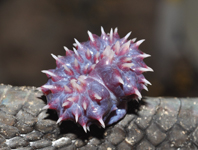Abstract
Six new epigean freshwater species of the genus Caecidotea in Mexico are described. These species were collected in waterbodies located along the Trans-Mexican Volcanic Belt (TMVB) and the eastern slope of the country: Caecidotea buzwilsoni sp. nov., Caecidotea chicoensis sp. nov., Caecidotea alvarezi sp. nov., Caecidotea mintzita sp. nov., Caecidotea zacapuensis sp. nov., and one additional species Caecidotea villalobosi sp. nov. is described from the Papaloapan basin at the Atlantic Slope of Mexico. The taxonomic treatment for each species includes a detailed description, figures of characters of diagnostic importance and comments. We also provide an updated map of Caecidotea records in Mexico. This work substantially increases the number of epigean Caecidotea known to occur in Mexico to 11 species, a new total of 99 species described to North America.
References
Alvarez, F., Villalobos, J.L., Hendrickx, M.E., Escobar, B.E., Rodríguez. A.G. & Campos, E. (2014) Biodiversidad de crustáceos decápodos (Crustacea: Decapoda) en México. Revista Mexicana de Biodiversidad, 85, S208–S219.
https://doi.org/10.7550/rmb.38758
Alvarez, F. & Villalobos, J.L. (2016) The Crayfish of Middle America. In: Kawai, T., Faulkes, Z. & Scholtz, G. (Eds.), Freshwater Crayfish. A Global Overview. CRC Press, Taylor & Francis Group, New York, New York, pp. 448–462.
https://doi.org/10.1201/b18723-22
Argano, R. (1972) An asellid of the subterranean waters of Veracruz, Mexico (Crustacea, Isopoda). Accademia Nazionale dei Lincei Quaderno, 171, 35–42.
Argano, R. (1977) Asellota del Messico meridionale e Guatemala (Crustacea, Isopoda). Accademia Nazionale dei Lincei, 171, 101–124.
Bowman, T.E. (1975) Three new troglobitic asellids from Western North America (Crustacea: Isopoda: Asellidae). International Journal of Speleology, 7, 339–356.
https://doi.org/10.5038/1827-806X.7.4.3
Campos, E.J.O., Lermo, S.J.F., Antayhua, V.V.Y., Chavacán, M. & Ramón, M.V.M. (2015) The Aztlán Fault System: control on the emplacement of the Chichinautzin Range volcanism, southern Mexico Basin, Mexico. Seismic and gravity characterization. Boletín de la Sociedad Geológica Mexicana, 67 (2), 315–335.
https://doi.org/10.18268/BSGM2015v67n2a13
Castro, F.R., Vergara, G., Bustos, M. & Mena, W. (2006) Diversidad y distribución de anfibios del estado de Morelos, México. Acta Zoológica Mexicana, 22, 103–117.
https://doi.org/10.21829/azm.2006.2211964
Cole, G.A. & Minckley, W.L. (1968) A new species of aquatic isopod crustacean (genus Asellus) from the Puebla Plateau, central Mexico. Proceedings of the Biological Society of Washington, 81, 755–760.
Escobar, B.E. & Alcocer, J. (2002) Caecidotea williamsi (Crustacea: Isopoda: Asellidae), a new species from a saline crater-lake in the eastern Mexican plateau. Hydrobiologia, 477, 93–105.
https://doi.org/10.1023/A:1021013132626
Espinosa, D. & Ocegueda, S. (2007) Introducción. In: Luna, I., Morrone, J.J. & Espinosa, D. (Eds.), Biodiversidad de la Faja Volcánica Transmexicana. Universidad Nacional Autónoma de México, México, D.F., pp. 5–6.
Ferrari, L., Orozco, E.T., Manea, V. & Manea, M. (2012) The dynamic history of the Trans-Mexican Volcanic Belt and the Mexico subduction zone. Tectonophysics, 522, 122–149.
https://doi.org/10.1016/j.tecto.2011.09.018
Flores, V.O. (1993) Herpetofauna of Mexico: distribution and endemism. In: Ramamoorthy, T.P., Bye, R., Lot, A. & Fa, J. (Eds.), Biological diversity of Mexico: origins and distributions. Oxford University Press, New York, New York, pp. 253–280.
García, V.L., Rodríguez, A.G. & Pedraza, L.C. (2019) Caecidotea camaxtli (Isopoda: Asellidae) a new species from the Tlaxcala valley, Mexico. Zootaxa, 4624 (3), 377–386.
https://doi.org/10.11646/zootaxa.4624.3.6
García, V.L. (2020) Revisión taxonómica de las especies epigeas del género Caecidotea Packard, 1871 (Crustacea: Isopoda: Asellidae) de la región central de México. Universidad Autónoma de Nuevo León. Facultad de Ciencias Biológicas, Tesis doctoral en Ciencias Biológicas con acentuación en Manejo de Vida Silvestre y desarrollo sustentable, Nuevo León, 488 pp.
Lewis, J.J. & Bowman, T.E. (1981) The subterranean asellids (Caecidotea) of Illinois (Crustacea: Isopoda: Asellidae). Smithsonian Contributions to Zoology, 335, 1–66.
https://doi.org/10.5479/si.00810282.335
Martínez, A.A., Ceccarelli, F.S., Eguiarte, L.E., Vázquez, D.E. & Pérez, P.D.G. (2014) Do the Historical Biogeography and Evolutionary History of the Digenean Margotrema spp. across Central Mexico Mirror Those of Their Freshwater Fish Hosts (Goodeinae)? PLoS ONE, 9 (7), 1–12.
https://doi.org/10.1371/journal.pone.0101700
Miller, R.R., Minckley, W.F. & Norris, S.M. (2005) Freshwater fishes of Mexico, Chicago, University of Chicago Press, 490 pp.
Pedraza, L.C., Doadrio, I., Breinholt, J. & Crandall, K. (2012) Phylogeny and evolutionary patterns in the Dwarf Crayfish subfamily (Decapoda: Cambarellinae), PLoS One, 7 (e48233), 1–18.
https://doi.org/10.1371/journal.pone.0048233
Rocha, R.A. & Peñaloza, D.A. (2011) Caecidotea xochimilca (Isopoda, Asellidae), a new species from lake Xochimilco, Mexico, with a key to Mexican species of the genus Caecidotea. Crustaceana, 84 (1), 93–106.
https://doi.org/10.1163/001121610X546715
Ruíz, S.E. & Specht, C.D. (2013) Influence of the geological history of the Trans‐Mexican Volcanic Belt on the diversification of Nolina parviflora (Asparagaceae: Nolinoideae). Journal of Biogeography, 40, 1336–1347.
https://doi.org/10.1111/jbi.12073
Say, T. (1818) An account of the Crustacea of the United States, part 7. Journal of the Academy of Natural Sciences of Philadelphia, 1, 374–401.
Schönhuth, S., Blum, M.J., Lozano, V.L., Neely, D.A., Varela, R.A., Espinosa, H., Perdices, A. & Mayden, R.L. (2011) Inter-basin exchange and repeated headwater capture across the Sierra Madre Occidental inferred from the phylogeography of Mexican stonerollers. Journal of Biogeography, 38, 1406–1421.
https://doi.org/10.1111/j.1365-2699.2011.02481.x
Sigala, I., Caballero, M., Correa, M.A., Lozano, G.S., Vázquez, G., Pérez, L. & Zawisza, E. (2017) Basic limnology of 30 continental waterbodies of the Transmexican Volcanic Belt across climatic and environmental gradients. Boletín de la Sociedad Geológica Mexicanai, 69 (2), 313–370.
https://doi.org/10.18268/bsgm2017v69n2a3
Williams, W.D. (1970) A revision of North American epigean species of Asellus (Crustacea: Isopoda). Smithsonian Contributions to Zoology, 49, 1–79.
https://doi.org/10.5479/si.00810282.49
.


